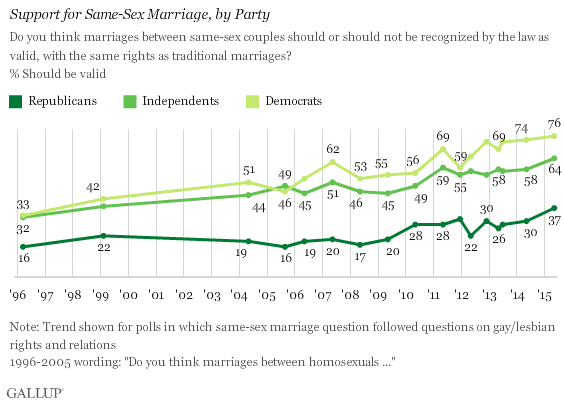Public support for the legality of same-sex marriage first reached a majority in 2011, when 53% supported it. Since then, support has ranged from 48% to 55%. The five-percentage-point increase in this year's Values and Beliefs poll, conducted May 6-10, is the largest year-to-year climb since 2011, when support rose by nine points.
Support for the legality of gay marriages in the U.S. has been a fast-changing trend. Just two decades ago, only 27% of Americans backed gay marriage, while 68% opposed. By 2005, the percentage in favor had increased by 10 points to 37%, and by 2010 it had reached 44%.
The record high in support comes roughly one month before the Supreme Court is to issue a ruling on the constitutionality of same-sex marriage. Americans, at this point, are not highly familiar with the case, with 42% following it closely -- well below the average 60% for news issues Gallup has measured over the past two decades. Attention to the case is similar among supporters and opponents of gay marriage.
Though same-sex marriage continues to be politically divisive, support for its legal status has reached new highs among Americans of all political stripes -- with Democrats at 76% support, independents at 64% and Republicans at 37%.

In general, Democrats have been the most likely to say gay marriage should be legal, and Republicans have been the least supportive. Independents typically fall in between but side closer to Democrats than to Republicans.
From a long-range perspective, Democrats' support has increased the most, by 43 points since 1996. That was the year Democratic President Bill Clinton signed into law the now-overturned Defense of Marriage Act (DOMA), which barred federal recognition of state-granted gay marriages. Since then, the Democratic Party has undergone a complete makeover on the issue, and its members have been champions of marriage equality on the state level. Democrats' support for same-sex marriage first reached majority level in 2004, the same year Massachusetts became the first state to legalize it.
Republicans have consistently been the least likely to say same-sex marriage should be legal, and their support has increased the least since 1996, by 21 points. Between 1996 and 2009, no more than 20% of Republicans believed same-sex marriages should be legally valid. Since then, support has ranged from 22% to 31%, leading up to this year's high of 37%.
The party divide between Democrats and Republicans may hinge largely on the age groups that compose each party. Gallup has found that younger Americans are significantly more likely to lean Democratic, while older Americans skew Republican. And while majorities of each age group under 65 support marriage equality in 2015, those aged 65 and older are still more likely to oppose it. This is a new phenomenon for the 50- to 64-year-old group. Last year, just 48% of these middle-aged Americans supported legally recognizing gay marriage. But in 2015, this figure has climbed to a majority of 54%.
About a quarter of Americans (26%) say they vote for a political candidate solely based on his or her stance on gay marriage. Many others say it is but one of several important factors (43%), and about one in four say it is not a major issue influencing how they vote (26%).
The 26% of American adults who say a candidate must share his or her views on the issue of same-sex marriage is up from just 16% in 2004 and 2008.
National support for marriage equality has been fairly steady in its upward climb, and is more than double what it was in 1996 when Gallup first polled on the issue. A clear majority of Americans now support the issue. The increase among Americans -- an increase seen in all major political parties -- comes in the midst of a string of legal victories ruling in favor of same-sex couples seeking to be treated equally under the law.
The Supreme Court may issue the final word on the constitutionality of same-sex marriage next month, although it's certainly possible that it may issue a narrow ruling on technical aspects of same-sex marriage law rather than say it should be legal in all states. With the ideological make-up of the court, it could decide that same-sex marriage is not a constitutionally supported right -- though this is a less likely outcome, and would go against prevailing public opinion.
While there has been uneven growth in support among Republicans versus Democrats, both groups have become more supportive. The remaining broad partisan divide, however, underscores how contentious the issue will continue to be as the 2016 election process unfolds.
As Hillary Clinton seeks the Democratic nomination in 2016, her support for gay marriage may be even more important as her party embraces the platform more closely than it has in the past. Clinton, like President Barack Obama, changed her stance in 2013 upon her exit from the State Department.
So far, none of the Republicans who have announced their 2016 candidacy support gay marriage, and neither have any potential candidates who are expected to officially throw their hats in the ring. Former Florida Gov. Jeb Bush, who is widely viewed as a top 2016 contender, recently doubled down on his stance against gay marriage -- a move consistent with the opinions of rank-and-file Republicans who, despite showing increased support for gay marriage, still oppose it outright. While an anti-same-sex marriage position should not present a challenge for GOP candidates in the primary, it could be more challenging in a general election setting given majority support among all Americans. At the same time, same-sex marriage, like many other moral issues, tends to rank well behind issues such as the economy, terrorism and education when Americans name the issues that are most likely to influence their vote.

No comments:
Post a Comment